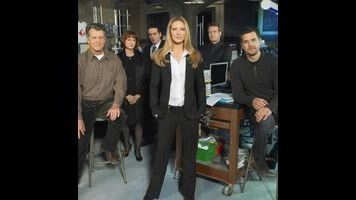Now that we've gotten the "Man, that sucked!"/"Aw c'mon, it's not so bad!" stuff out of the way, it's time to settle into what is often the pivotal moment for any TV series with potential long-term geek appeal: The second episode.
Ever since reading Bill Carter's book Desperate Networks, I've been fascinated by second episodes. Carter writes extensively about ABC's development of Lost and Desperate Housewives in 2004, emphasizing how much time and effort and money went into producing kick-ass pilots for each show, and how panic set in among the show-runners after the network pick-up, once they realized they were now going to produce a new one of these roughly every week–and on a tighter budget.
The second episode of Fringe falls into the trap so many new series do: it essentially repeats the pilot, with a few new characters and a little more backstory. Once again, we get another shocking opening: A woman relaxing after a sexual liaison with a creepy dude suddenly feels something stirring in her belly, which turns out to be a rapidly developing fetus. By the time she gets to the emergency room, the baby's ready to be born. The woman dies giving birth, and four hours later the baby dies too, though it's no longer a baby–it's a full-grown, elderly man, with an umbilical cord still trailing off his belly and placental gore still coating his skin.
As for the creepy dude, our heroine Olivia Dunham quickly realizes that he may well be a serial killer that she and her corrupt, newly dead ex-partner John Scott pursued before and never caught. This particular serial killer in known for torturing his victims, then removing their pituitary glands. This rings a bell with Dunham's new mad scientist pal Walter Bishop, who postulates that the killer is a refugee from a super-soldier project. The original idea was to grow soldiers in a Petri dish, but they all grew too fast; Bishop thinks the bad guy is gobbling down pituitary glands in order to stunt his growth.
And how will they find him? Well, they have one of his victims in their lab, and Bishop figures that there's a record of the last images she saw still burned in her retina, and that he can extract it. (Shades of last week's LSD-aided journey into the unconscious.) Meanwhile, Bishop's still acting nuts, his son is still constantly irritated, and Dunham's still dealing with the cryptic instructions of her boss Philip Broyles, as well as the confounding motives of Massive Dynamics' corporate figurehead Miss Sharp. In other words… If you watched the first episode of Fringe, you've more or less seen the second one.
Which means you've already seen the best and worst of what Fringe has to offer so far. Dunham's dialogue continues to be singularly stilted–or maybe Anna Torv just has no knack for delivering it–while Bishop's crackpot non-sequiturs continue to be pretty amusing and a little sad. (When Broyles reminds him that he has a lab, and Bishop mutters, "That's fantastic news," John Noble gives the line-reading an unexpectedly somber spin… and yet it still made me chuckle.) And while the corny recap of the series' premise and the re-heated action had me sighing impatiently, I once again dug the junky DIY science, involving scooping out eyeballs and jerry-rigging defibrillators and triangulating the position of the antagonist using photos and computer models. And I was intrigued by the hint Bishop drops at the end that his son has some kind of shady "medical history."
So I'm still on-board, even though I liked this episode less than the premiere. The promise of Fringe is that it'll be a sort of freaky CSI, combining procedural beats with mind-blowing absurdity. That promise is still there. But as of yet… nothing great.
Grade: C+
Stray observations:
-Because I was out of the country last week, I wasn't able to participate in the discussion about the pilot as much as I would've liked. Obviously I enjoyed the first episode more than a lot of you did, despite some qualms. Generally speaking, I can't really refute the criticisms some of you had of Fringe: the show is hammy, and derivative, and preposterous. But at the moment, none of that bothers me all that much. I'm more a TV geek than a sci-fi geek, so I tend not to sweat the science-y details on fantasy fare. If someone tells me they can communicate with the dead via electrodes, I shrug and say, "Okay"… I don't need a lot of explanation. And if a show establishes itself as broadly drawn and somewhat dopey, I'm willing to give it a chance to see if it can carry that tone off successfully, week after week. Just as I don't think single-camera, laugh-track-free sitcoms are inherently superior to three-camera, laugh-track-stocked shows, I don't think every action-drama has to be The Shield–or even Lost. There's room in my TV diet for a show more loaded up with sugar and salt. At the moment, I like the ingredients in Fringe, but the flavor's still not quite right. A little less portentousness and a little more let-'er-rip will do Fringe a world of good.
-Remember: "Even condoms are not 100% effective. You two should be aware of that."

 Keep scrolling for more great stories.
Keep scrolling for more great stories.
